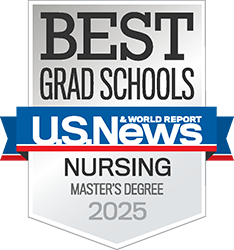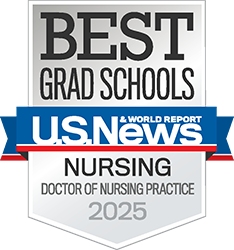

Cizik Lecture
NINR director emphasizes nurse researchers’ unique perspective
Nurses’ daily interactions with patients inside and outside of clinical settings make them uniquely positioned to address the most pressing and persistent health care challenges of our time, National Institute of Nursing Research (NINR) Director Shannon N. Zenk, PhD, MPH, RN, FAAN, told an audience at Cizik School of Nursing at UTHealth Houston on April 26.
Zenk delivered the keynote speech at the 2023 Jane and Robert Cizik Lecture and Reception. This annual series is made possible by a foundational $25 million gift from Jane Cizik and her late husband, Robert. The school was renamed in honor of the Cizik family’s 2017 gift, which also established endowments to support faculty research and student scholarships.
“With their ability, knowledge, and perspective, nurse scientists design research projects that have significant, real-world impacts on patients’ lives,” Zenk said, addressing an audience of more than 80 in-person and virtual attendees.
Her own research focuses on social inequities and health disparities. Working as a case manager early in her career, Zenk was impressed by the tremendous differences in environments and access to health resources in the neighborhoods where she worked. Eventually, she led a research team that identified and raised awareness of food deserts, or inadequate access to healthful foods, particularly in low-income and Black neighborhoods. Her work grew to include the use of GPS tracking to study health environments not only where people live, but also where they work and spend time.
One of the newest projects for Zenk and her team is a study of how heat exposure affects health behaviors, and how urban heat related to climate change might exacerbate health disparities.
Under her leadership, Zenk emphasizes multilevel, cross-disciplinary approaches to improve health and eliminate racial/ethnic and socioeconomic health disparities. These priorities are reflected in the NINR’s five “research lenses” identified to best leverage the strength of nursing research: health equity, social determinants of health, population and community health, prevention and health promotion, and systems and models of care.
Other innovative avenues of nursing research that Zenk highlighted include studies related to firearm injuries, the legacy of health disparities linked to neighborhood redlining by mortgage companies, and maternal health among underserved populations. “I believe that the nursing perspective is vital for this area of research,” she said of the latter.
She also noted Cizik School of Nursing Dean Diane Santa Maria, DrPH, MSN, RN, FAAN, and her NINR-funded study, “Come As You Are - Assessing the Efficacy of a Nurse Case Management HIV Prevention and Care Intervention Among Homeless Youth.” Santa Maria’s work is a prime example of expanding the scope of a research project with supplements to explore different factors affecting the same underserved population.
Zenk advised early career nurse scientists to, “Make sure to pick a topic you are passionate about.” She also urged them to collaborate with others and said one of her most rewarding experiences as NINR director is working with leaders in other health professions who understand the value nursing brings to research.
“It’s great to be at the table with colleagues, and to be leading at the table,” she said.
Zenk is a member of the National Academy of Medicine and was inducted into the Sigma Theta Tau International Honor Society of Nursing’s International Nurse Researchers Hall of Fame in 2019. She previously served as a professor at the University of Illinois Chicago (UIC) College of Nursing. Zenk earned her bachelor’s degree in nursing from Illinois Wesleyan University in Bloomington, master’s degrees in public health nursing and community health science from UIC, and a doctorate in health behavior and health education from the University of Michigan at Ann Arbor.




